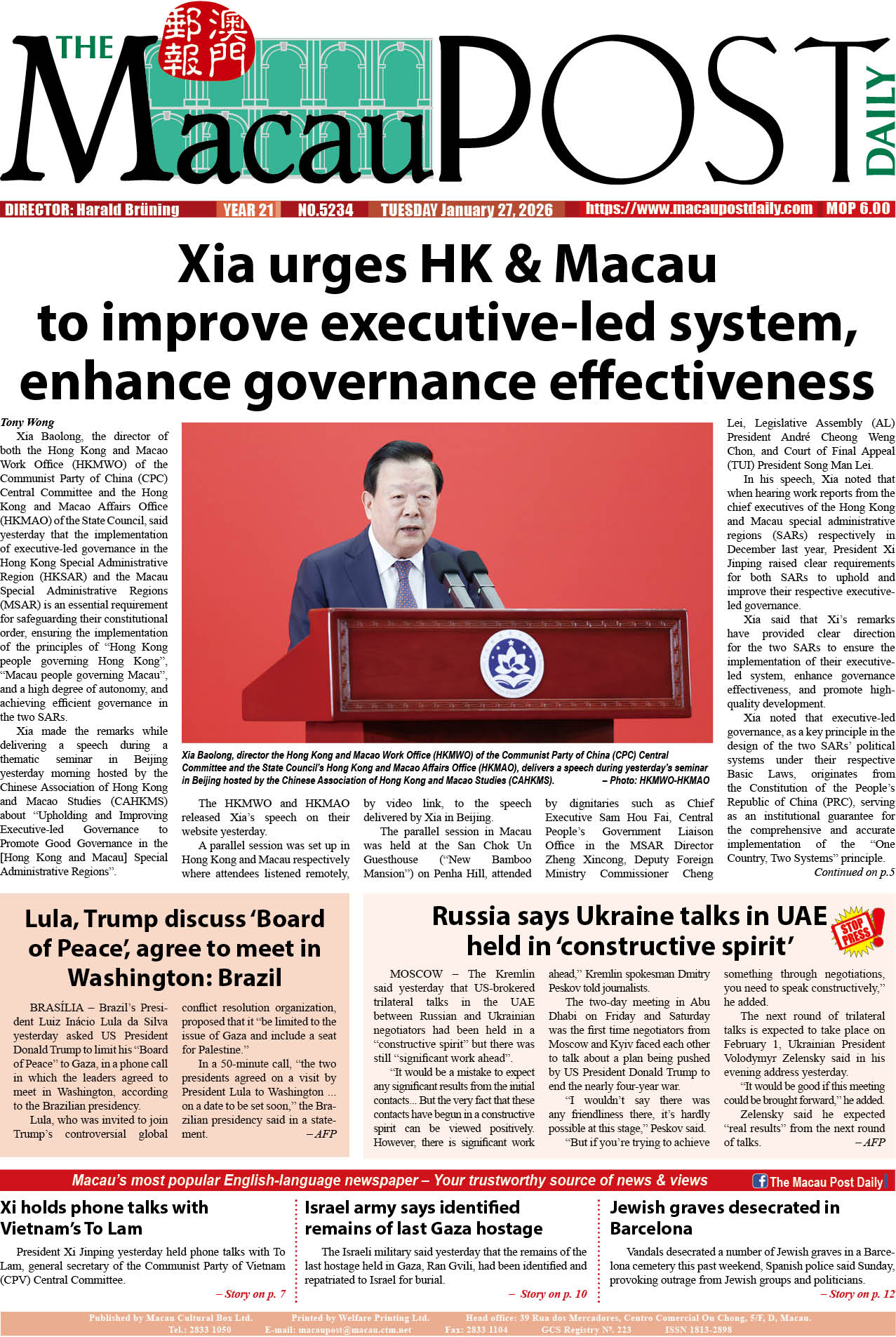Secretary for Administration and Justice André Cheong Weng Chon said yesterday that no schools will be built on the plot of land where the former greyhound racetrack is located, adding that the government was now planning to convert the 40,000-square-metre plot into a park with various sports facilities.
Cheong pointed out that the Zone A land reclamation area has sufficient plots available for schools currently without their own campus facilities to be relocated, because of which the government has decided to cancel the construction of four schools in its latest development plan for the plot of the former dog racetrack in Fai Chi Kei.
Cheong made the remarks during a one-day Q&A session in the legislature’s hemicycle about his portfolio’s policy guidelines for next year.
In 2016, the government told the then greyhound racetrack operator – Yat Yuen Canidrome – to vacate the property within two years. The racetrack was finally closed in July 2018.
The then secretary for social affairs and culture, Alexis Tam Chon Weng, told lawmakers in late 2017 that the government was proposing to build four schools, including a special needs school, on an area designated for educational facilities on the plot after the closure of the racetrack. The then proposed construction of the four schools on the plot was part of the government’s “Blue Sky Project” that aims to enable schools with their facilities on the lower floors of high-rise buildings to finally move into their own buildings.
Tam is now Macau’s official representative in Lisbon.
Some of the city’s schools still do not have their own campus, having their classrooms on the lower floors of high-rise buildings. The government launched the “Blue Sky Project” in 2016 to tackle the problem.
In August 2018, the government announced a development plan for the plot where the former greyhound racetrack and the adjacent government-run Lin Fong Sports Centre are located, comprising an area of 26,500 square metres earmarked for sports facilities, an area of 8,000 square metres designated for education facilities, and an area of 3,900 square metres earmarked for community service facilities.
Tam told legislators in late 2018 that the government had decided to designate the area earmarked for education facilities on the ex-Canidrome plot for the new campuses of Lou Hau High School, Xin Hua School, Santa Madalena School, and Concórdia School for Special Education. Lou Hau High School, which was then named Workers’ Children High School, changed to its current name last year. The Concórdia School for Special Education is located in Nape, while the other three schools are situated in the peninsula’s northern district.
Representatives from the education sector had said that the then proposed area of 8,000 square metres earmarked for education facilities on the ex-Canidrome plot was insufficient for the construction of four schools.
Yesterday’s remarks made by Cheong means that the government has now cancelled the development plan announced in 2018.
Cheong revealed the government’s latest development plan for the ex-Canidrome plot during yesterday’s Q&A session in reply to a question by directly-elected legislator Leong Sun Iok.
Cheong noted that the government originally planned to build four schools on the plot of the former dog racetrack as part of its “Blue Sky Project”. However, Cheong said, the government now does not plan to build any schools there in its latest development plan for the plot, as “good” plots have now been earmarked for school projects in Zone A – which lies off the north-eastern coast of the peninsula. The number and size of plots in Zone A designated for education facilities is sufficient for the existing schools that have classrooms on the lower floors of high-rise buildings to move to, according to Cheong.
Cheong said that the government was now planning to convert the ex-Canidrome plot, which covers about 40,000 square metres, into a park featuring various sports facilities for the peninsula’s northern district.
Cheong said that the government now also plans to build an underground car park there.
According to Cheong, the Municipal Affairs Bureau (IAM) – which manages the city’s parks – is discussing details about the proposed park project equipped with sports facilities with the Sports Bureau (ID) and the Lands, Public Works and Transport Bureau (DSSOPT).
Cheong said that the government expected the park project on the ex-Canidrome plot to be completed in a few years.
Tyre park project suspended
Meanwhile, Cheong also revealed that the government has decided to suspend its plan to build the city’s first-ever tyre park in an area comprising four idle plots in Taipa.
Cheong said that the government has made the decision after considering the divergent opinions that have been raised in civil society since the plan was announced last year.
The Municipal Affairs Bureau (IAM) announced in August last year that it planned to convert four idle plots of land that are located next to each other covering an area of about 19,000 square metres in total in central Taipa into a temporary tyre park with a budget of 30 million patacas, with the aim of enabling residents to enjoy a new leisure space as soon as possible by making good use of idle plots of land, before determining the area’s permanent use in line with the city’s future urban master plan. Cheong told reporters later the same month that a row of former textile factory buildings situated in the area needed to be demolished as they were posing an environmental hygiene threat to the nearby residential neighbourhoods, apart from the fact that some of the low-rise buildings have asbestos roofs, a prohibited construction material which is harmful to people’s health.
During yesterday’s Q&A session, Cheong noted that since the COVID-19 pandemic which started early last year, the government has been planning various public projects with the aim of boosting the local economy. Cheong admitted that the government prematurely announced details of its plan last year to build a tyre park without having fully consulted civil society. Since the announcement of the proposal, Cheong said, various opinions had been raised in civil society, such as the view that it would be a waste use of money from the public coffers to build a tyre park only slated to operate temporarily, and also to keep the former textile factory buildings intact. According to Cheong, the Cultural Affairs Bureau (IC) – the government entity overseeing the city’s heritage protection matters – had given a green light to the demolition of the old factory buildings.
Consequently, Cheong said yesterday, the government has now decided to suspend its plan for a temporary tyre park in the area. Cheong pledged that the government will carefully listen to opinions and suggestions raised in civil society about the future use of the area in line with the official urban master plan – which is now slated to be published at the end of this year.
New ID card
Meanwhile, Identification Services Bureau (DSI) Director Wong Pou Ieng revealed during yesterday’s plenary session that the government is planning to issue a new generation of ID cards in 2023. Wong noted that her bureau started to issue the current generation of ID cards in 2013, which will have been used for a decade in 2023. Wong said that an IT system would normally become obsolete after it has been used for 10 years, because of which, she said, it is difficult for her bureau to continue its maintenance of the IT system as its respective software is difficult to obtain nowadays.

Secretary for Administration and Justice André Cheong Weng Chon addresses yesterday’s Q&A session about his portfolio’s 2022 policy guidelines in the Legislative Assembly’s (AL) hemicycle.

Identification Services Bureau (DSI) Director Wong Pou Ieng speaks during yesterday’s plenary session in the legislature’s hemicycle. Photos: GCS





